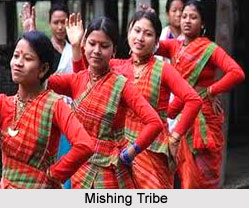 The Mishing tribes, also known as Miri by the local people, chiefly reside in the nine districts of Assam, Dibrugarh, Golaghat, Tinsukia, Sonipur, Darang, Sibsagar, Dhemagi, Jorhat and North Lakhimpur. They usually live on the banks of rivers in small huts. The Mishing tribes are scattered over a wide area and reside in different villages.
The Mishing tribes, also known as Miri by the local people, chiefly reside in the nine districts of Assam, Dibrugarh, Golaghat, Tinsukia, Sonipur, Darang, Sibsagar, Dhemagi, Jorhat and North Lakhimpur. They usually live on the banks of rivers in small huts. The Mishing tribes are scattered over a wide area and reside in different villages.
Ghagar Village
Ghagar, located along the Subansiri River in the Lakhimpur District, is almost 12 kms away from North Lakhimpur town. There are almost 65 households in this village. Each of these household presently possesses one local traditional loom. The Chang Ghar i.e. a house having an elevated platform is a conventional housing style of the Mishing tribes.
Ghunasuti Village
Ghunasuti village is at a distance of almost 16 kms from the North Lakhimpur town. One needs to ride a machine boat to cross the Subansiri River and then walk almost 4 kms to reach the village. The Subansiri River and Brahmaputra River are located on either side of the village. The Mishings residing here are highly skilled in art and craft work. Weaving is their primary craft work and the inhabitants adorn themselves with self-woven clothes. The women folk of the village are proficient at manufacturing of traditional Mishing clothes like Makhela Chaddor, Mirizim, Ribigasang, Erhee Chaddor, Galuk, Mibu, Gamucha and others.
Tajik Gaon, Gogamukh
Tajik Gaon is located at a distance of 2.5 kms from Gogamukh under the Dhemaji District. Gogamukh is located at a distance of 28 kms from Dhemaji town. It is a traditional village dominated by the Mishings. The village has a total of 260 households. The womenfolk of the village are highly skilled weavers and they remain engaged in weaving their daily household clothes like Mekhala Chaddor, Ribigasang, Erhee Chaddor, Mirizim, Gamucha, Mibu, Galuk and others. Tajik Gaon also has accommodation facilities for the tourists. A Forest Guest House has also been set up here.
Pomuwa, Gogamukh
Pomuwa is a traditional village mainly resided by the Mishing tribes. The village is almost 3 km away from Gogamukh Central and 7 km away from Bordoibam Beelmukh Birds` Sanctuary. It is well connected by road and is on the way to Dhakuwakhana. Pomuwa. It is divided into two parts Namoni Pomuwa and Ujani Pamuwa. At present the village has 200 households and every household here possesses an individual loom made of bamboo and wood. The womenfolk of the village are highly skilled weavers and engage in weaving daily traditional clothes. The village has been bestowed with the State Tribal Handloom Designer Awards in 2004.
Karichuk, Dhemaji
Karichuk, dominated by the Mishing community, is situated at a distance of 1.5 km away from Dhemaji Bus Station and is 1 km from Dhemaji Railway Station. Karichuk is situated in Dhemaji town area and has almost 300 Mishing families residing here. They are chiefly employed in the Government service yet keeping pace with the tradition every household possesses at least one loom. They manufacture their own clothes and presently they also engage in weaving clothes for commercial purpose. The village has accommodation facilities for the tourists. Popular hotels like, Main Road Dhemaji, Raj Hotel, Main Road Dhemaji, Hotel Manash, and Shikha Hotel are located here.
Bahir-Jonai, Jonai
Bahir-Jonai is situated at a distance of 4 km far away from Jonai Town. The Jonai civil sub-division is located at the north eastern corner of Dhemaji District of Assam. The village resided by Mishings is rich in art and culture. The inhabitants of the village are engaged in art and culture and specialise in weaving. The village has almost 100 households. Tourists visiting the village can put up at Jonai Circuit House; C. K. Hotel and Restaurant, Jonai Bazar or at Beauty Hotel.
Ratanpur, Jonai
Ratanpur, resided by the Mishing tribes is situated on the northern bank of Brahamputra River. It is located at a distance of 5 kms from Jonai town. Almost 65 families reside in this village. Every household here upholds the tradition of weaving. Young girls as well as the women of the village are highly skilled in the art of weaving various types of colourful dresses. Most villagers here are function independently and weave their own daily required garments like Makhela, Mibu Galuk, Erhi chador, Ri:bi:gasang, Chadder, Gamucha etc.
















